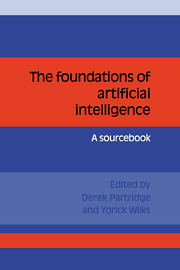Book contents
- Frontmatter
- Contents
- List of contributors
- Preface
- Acknowledgments
- 1 Introduction
- 2 The formal foundations of AI
- 3 Levels of theory
- 4 Programs and theories
- 5 The role of representations
- 6 The role of programs in AI
- 7 Rational reconstruction as an AI methodology
- Three Novelties of AI: theories, programs and rational reconstructions
- AM: a case study in AI methodology
- 8 Is AI special in regard to its methodology?
- 9 Does connectionism provide a new paradigm for AI?
- 10 The role of correctness in AI
- 11 Limitations on current AI technology
- 12 Annotated bibliography on the foundations of AI
- Index of names
Three Novelties of AI: theories, programs and rational reconstructions
Published online by Cambridge University Press: 03 May 2010
- Frontmatter
- Contents
- List of contributors
- Preface
- Acknowledgments
- 1 Introduction
- 2 The formal foundations of AI
- 3 Levels of theory
- 4 Programs and theories
- 5 The role of representations
- 6 The role of programs in AI
- 7 Rational reconstruction as an AI methodology
- Three Novelties of AI: theories, programs and rational reconstructions
- AM: a case study in AI methodology
- 8 Is AI special in regard to its methodology?
- 9 Does connectionism provide a new paradigm for AI?
- 10 The role of correctness in AI
- 11 Limitations on current AI technology
- 12 Annotated bibliography on the foundations of AI
- Index of names
Summary
Most of the difficulty of including AI in the standard collection of sciences is that there are recurring features of the best or most-publicized work in AI that are hard to fit into the conventional observation-hypothesis-deduction-observation pattern of those sciences. Some parts of the difficulty can be clarified and resolved by showing that certain details of what is involved in AI have underlying similarities with corresponding steps in other sciences, despite their superficial differences. The treatment of ‘theories’ and ‘programs’ below is intended as a commentary on that remark. A further part of the difficulty is that AI still lacks some scientific credibility because it does not yet seem to have the standard of reproducibility and communicability of results that is built into other sciences. The difficulty is illuminated by activities in AI research that have come to be known as ‘rational reconstructions’. While the earliest attempts at rational reconstruction have generally been less than successful, the idea itself is potentially useful as a means of generating new knowledge or mapping out new territory in AI.
On theories, models and representations
Sciences are supposed to have underlying theories, and technologies rely on theories through the help of their supporting sciences. The first hesitation among outside observers to give AI full credit for being a science or technology comes from the difficulty of identifying AI's theory or theories.
Information
- Type
- Chapter
- Information
- The Foundations of Artificial IntelligenceA Sourcebook, pp. 237 - 246Publisher: Cambridge University PressPrint publication year: 1990
Accessibility standard: Unknown
Why this information is here
This section outlines the accessibility features of this content - including support for screen readers, full keyboard navigation and high-contrast display options. This may not be relevant for you.Accessibility Information
- 1
- Cited by
